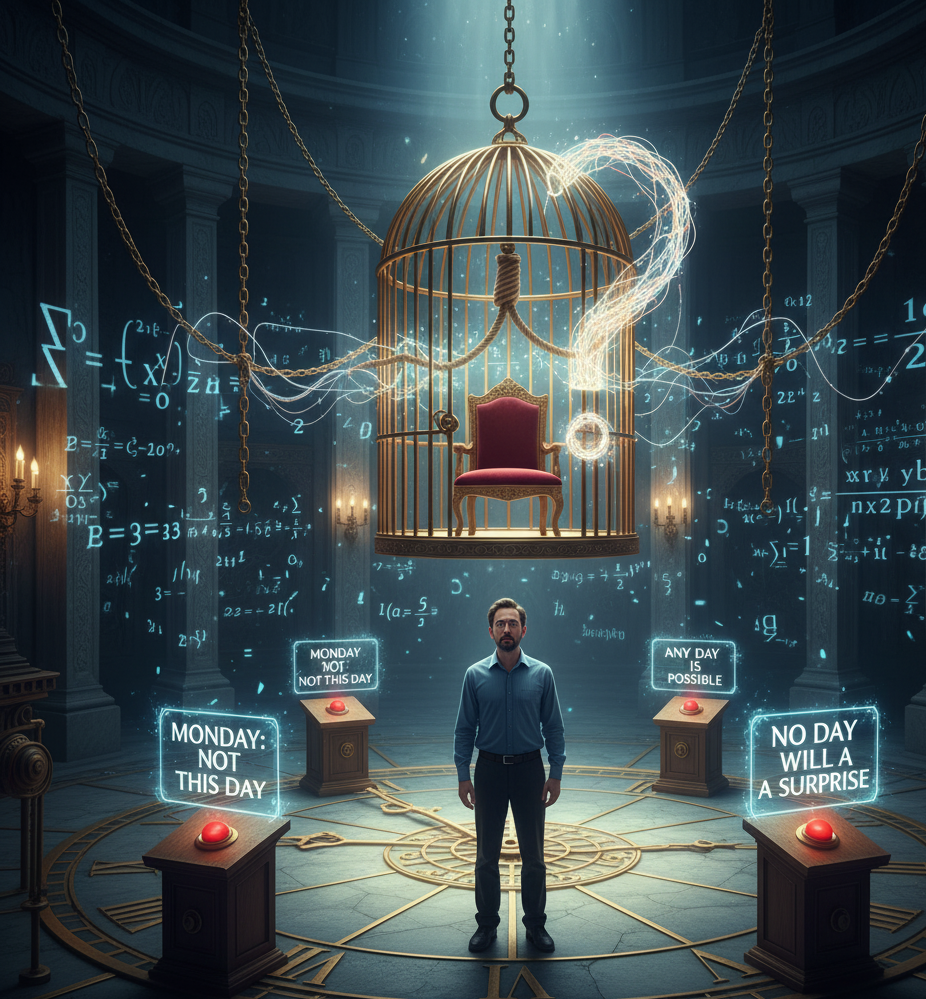LOGIC COLLAPSES: HOW A PRISONER, WHO REASONED PERFECTLY, WAS STILL HANGED? THE UNEXPECTED HANGING PARADOX

The Century-Old Enigma: How Did a Judge’s ‘Surprise’ Sentence Defy Logical Deduction and Fuel Philosophical Debates?
LONDON / CAMBRIDGE – The Unexpected Hanging Paradox, debated within philosophy, mathematics, and information theory since the 1940s, strikingly illustrates how sound logic can lead to a false conclusion. This famous puzzle begins with a simple premise but radically challenges notions of absolute knowledge and surprise. Its solution remains a source of deep disagreement among academic circles.
❓ THE PARADOXICAL PREMISE: TWO IMPOSSIBLE CONDITIONS
The paradox revolves around a judge’s sentence containing two simple, yet seemingly contradictory, conditions: A condemned prisoner is told they will be executed by hanging at noon on one day next week (Monday through Friday). However, the judge stipulates that the execution must come as a complete surprise to the prisoner; they must not know the day of the hanging beforehand.
The judge’s ruling contains two core claims:
- The execution will definitely take place on one of the weekdays.
- The day of execution will definitely be a complete surprise to the prisoner.

⛓️ THE PRISONER’S FLAWLESS LOGICAL DEDUCTION
The prisoner starts reasoning, convinced that both conditions cannot be met simultaneously, thus concluding he will be saved:
- Elimination of Friday: The execution cannot happen on Friday. Because, if the prisoner is still alive by noon on Thursday, only Friday remains. Therefore, he would know with certainty that the hanging must occur on Friday. This situation violates the judge’s “surprise” condition. Consequently, the prisoner logically eliminates Friday.
- Elimination of Thursday: The prisoner accepts that Friday is eliminated. Now, if the prisoner is not hanged by noon on Wednesday, only Thursday remains (since Friday is out). Thus, he would know with certainty the execution must happen on Thursday. This also violates the surprise condition. Therefore, he eliminates Thursday as well.
- Chain Elimination of Remaining Days: The prisoner applies the same backward reasoning to eliminate Wednesday, Tuesday, and Monday sequentially. As a result, the prisoner reaches a definitive logical conclusion that the execution cannot happen on any weekday and rests easy.

💥 THE CONFLICT: REALITY VS. REASON ON TUESDAY
While the prisoner concludes the hanging is impossible, the executioner knocks on his cell door on Tuesday. Herein lies the paradox.
- The Surprise Occurs: The prisoner’s chain of reasoning concluded the execution could not happen. Therefore, when the executioner arrives on Tuesday, the event comes as a complete surprise.
- The Core Conflict: The execution took place, fulfilling both of the judge’s criteria: (1) the hanging happened, and (2) it was a surprise to the prisoner. Yet, the prisoner’s reasoning, which appeared logically sound at every step, led him to the wrong conclusion. This demonstrates how rational deduction can falter against reality.
🧠 ATTEMPTS AT RESOLUTION AND EPISTEMIC LIMITS
Despite its simple presentation, the paradox generates deep philosophical questions about the nature of knowledge. Key approaches to solving it include:
- Epistemic Circularity: Many philosophers argue the flaw lies in the prisoner’s initial assumption that he can know his future state of knowledge with certainty. The judge’s sentence creates a logical contradiction regarding the prisoner’s knowledge itself.
- Defining Surprise: Others argue the term “surprise” does not need to be absolute; it only needs a set of more than one possible option to maintain uncertainty. Thus, the moment the prisoner eliminates all options, he invalidates the premise for all remaining days.
The Unexpected Hanging Paradox continues to be one of modern philosophy’s most compelling puzzles, illustrating the dynamic nature of information and how logical inference can be inadequate when faced with self-referential uncertainty.






